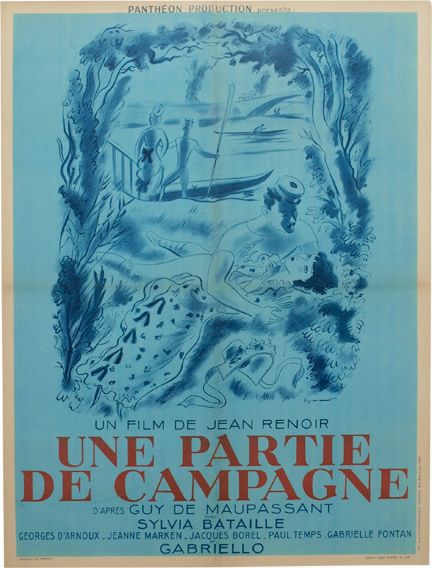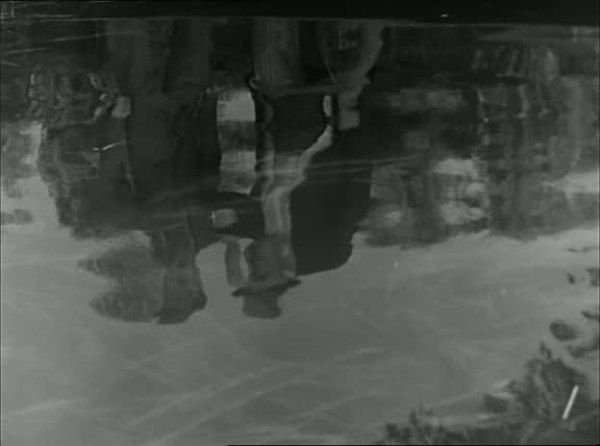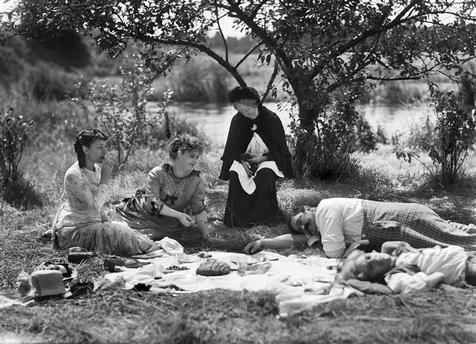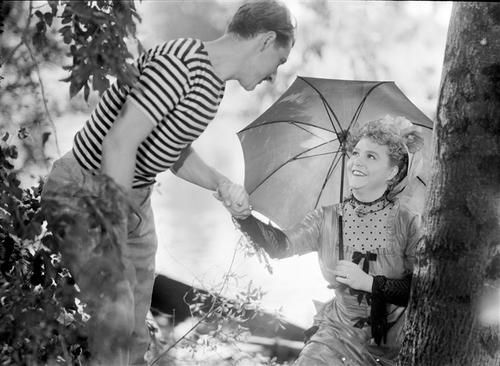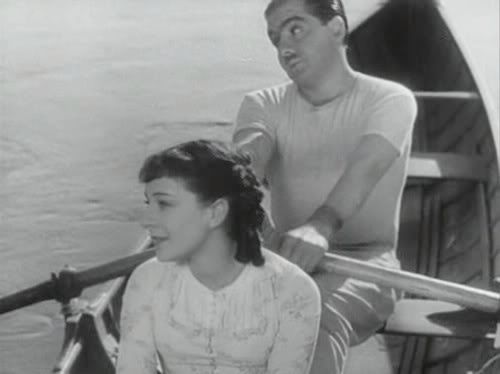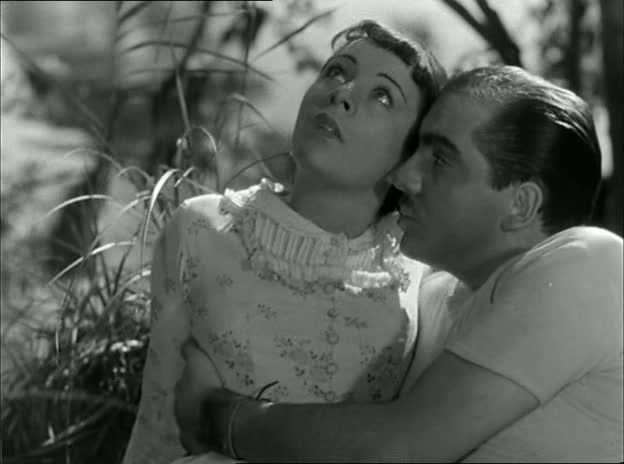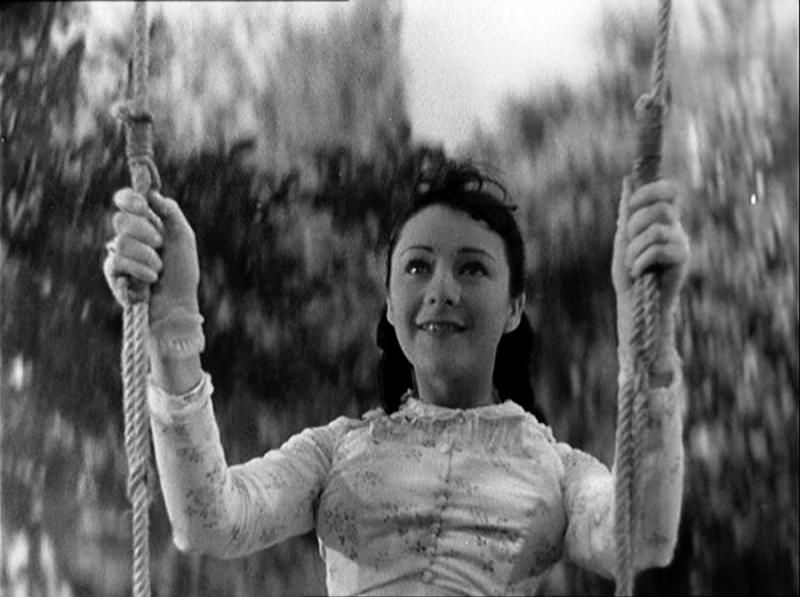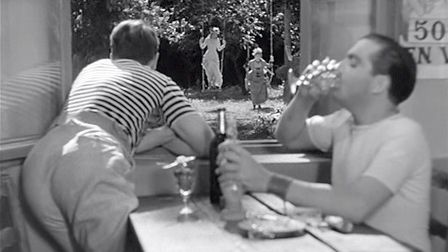Internet has been incredibly spotty and out for the past few days. We need a new modem, but can't get one until Monday. Ugh. Also - who gets a cold in June? Apparently I do. What the hell, body?
A
Day in the Country
1936
Director: Jean Renoir
Starring: Sylvia Bataille, Georges
D’Arnoux, Jacques B. Brunius, Jane Marken
What
is it about Jean Renoir that he can, even with an unfinished film, so deftly
strike at such powerful, soulful poignancies?
A Day in the Country was abandoned by Renoir and is clearly
incomplete, but he manages to still stir feelings of passion and tragedy in a
simple story.
Henriette
(Bataille), a young shopkeeper’s daughter from Paris, accompanies her parents,
grandmother, and, we learn, her future husband Anatole, for a day in the
countryside. Her family picnics under a
cherry tree where they are spied upon by Rodolphe (Brunius) and Henri
(D’Arnoux), two young boaters. Rodolphe
and his crazy moustache sets his sights on seducing Henriette and her mother
(Marken) by luring them away from the others, and Henri, rolling his eyes at
his friend’s antics, comes along for the ride.
But soon Henri and Henriette cannot deny their attraction for one
another, and a boat ride alone leads to romance. These are only moments of happiness, however,
as Fate has other plans for Henri and Henriette.
It’s
remarkable how in a brief, unfinished film of only 40 minutes, Renoir manages
to make me care far more about his leading couple than any romantic comedy from
the last 15 years has done. Undoubtedly
Renoir makes me care so much because of who he surrounds Henri and Henriette
with; namely, some of the silliest characters to ever grace the screen. Everyone except these two are essentially
cartoon characters. Henriette’s father
and Anatole look like Laurel and Hardy, as dad is a blundering buffoon and
Anatole is a pasty incompetent.
Henriette’s mother isn’t any better, fluttering around and having fits
and flirting with anything that crosses her path. Rodolphe’s personality is made infinitely
clear by the fact that he wears a mask to protect his moustache while he’s
eating. After that, it’s no wonder that
all he can think of is having a “bit of fun” with Henriette.
With
so much cartoon silliness around her, Henriette immediately stands apart from
her family. Her wide-eyed joy with which
she greets the country is different than her mother’s simpering. She is drinking the country in, overwhelmed
at its juxtaposition with the urban life she knows. The happiness she exudes while playing on the
swings is not the same as her mother’s fussy giggling, this much is clear. The same goes for Henri. I get the feeling he’s only friends with
Rodolphe because it’s convenient, and not because he likes him at all. Henri listens to his friend talk about
conquests and ignores it. When Rodolphe
suggests Henri distract Henriette’s mother so he, Rodolphe, can make time with
Henriette, Henri goes along with it more to shut him up than anything
else. Henri is serious, the antithesis
of the superficiality of everyone around him.
But as soon as we see Henri and Henriette side by side, it is clear that
they belong together. They have to be
together. It’s utterly necessary.
And
herein lies the tragedy of the film. We
learn right from the very beginning of the film that Henriette will eventually
marry Anatole. That’s important, because
there is a sense of sadness right from the beginning, knowing that her fate is
not with Henri. When Anatole is quickly
shown to be a useless clown, the happiness that we see in Henriette’s face
takes on a different tone. Rather than
being happy for her for having this day in the country, I felt immensely sad
that this was a one-off occasion, a day of bliss not likely to be repeated. With a few brief scenes of Anatole being
idiotic, it is all too clear what Henriette’s future will be.
And
this makes Henri and Henriette finding one another for the briefest of moments
so important and so romantic and so tragic.
Normally I am not a huge fan of tragic romances – I prefer my romances
to end happily, thank you very much – but Henri and Henriette were too soulful,
too perfect for me to not fall in love with myself. Renoir has this effect on me. He goes to a similar place, although not with
romantic lovers, in The Rules of the Game, by so tragically speaking of unrequited
love and class differences. A Day
in the Country is similar in terms of his ability to uncannily peel
back the outer layers of a story to get at an incredibly sad universal
truth.
In
terms of the filmmaking, although I cannot be certain, the beginning of the
film feels far more finished than the end.
I wouldn’t be surprised if the unfinished portion is the second
half. The opening is full of joy and
happiness and bright sunlight. A nice
moment is when Rodolphe throws open the shutters of a window to see Henriette
playing on the swings. Music erupts from
nowhere, and it’s pure joy – and pure Renoir.
The finale, full of wistful regrets and what might have been, feels far
too hasty and slapped together, and here is where it’s clear the film is
unfinished. However, this fact doesn’t
keep the story from being any less powerful.
I
like romantic movies, but my taste in them is a little different from
most. To me, A Day in the Country hits
an almost perfect note of brief joy and lifelong sadness. I admit right now, I find it utterly romantic. Oh, Henri and Henriette, why couldn’t Renoir
have found a way to give you a proper length film? I so badly want to see more of them, more of
their day together, or more of their brief reunion. But I can’t.
I only have this, and it’s not even available on DVD. Something’s better than nothing, I
suppose. I’ll choose Renoir’s take on
romance any day.
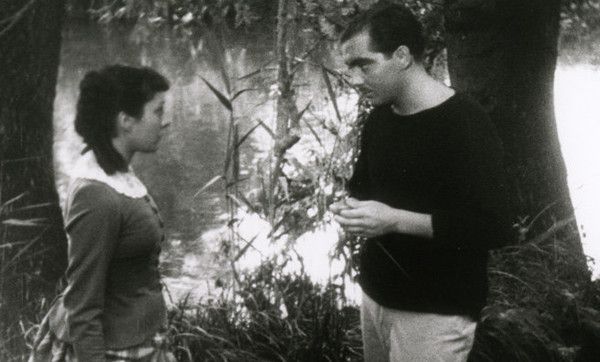 |
| The second meeting. |
Arbitrary
Rating: 9/10. High? Yes.
But that is how strongly I fell for Renoir’s story of Henri and
Henriette. It’s a fragment of a tale,
but when it’s got the goods, it works for me.
